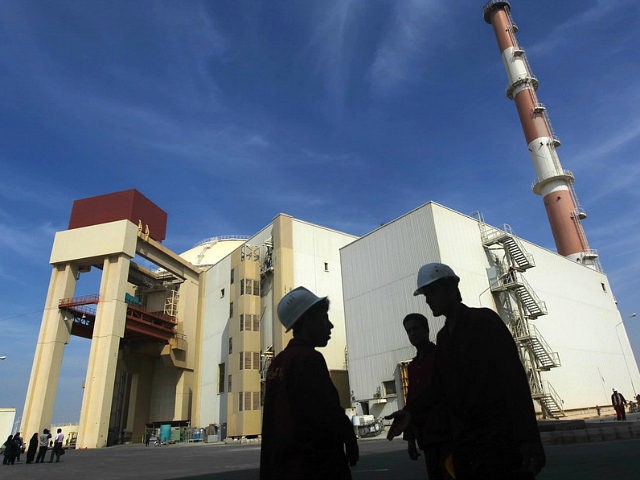Inspectors for the International Atomic Energy Agency (IAEA) on Monday confirmed a statement by Iranian Foreign Minister Mohammad Javad Zarif that Iran has violated the 300 kilogram limit on stockpiling enriched uranium established by the 2015 nuclear deal, formally known as the Joint Comprehensive Plan of Action (JCPOA).
The BBC reported Zarif’s claim and IAEA confirmation on Monday:
“Based on what I have been told, Iran has exceeded the 300kg limit in accordance with its plan,” Iranian Foreign Minister Mohammad Javad Zarif was quoted by Isna news agency as telling reporters in Tehran on Monday afternoon.
“We have clearly said what we will do and we will act accordingly. We deem it as part of our rights under the Joint Comprehensive Plan of Action,” he added, referring to the official name of the nuclear deal.
An IAEA spokesperson later told the BBC: “We can confirm that IAEA Director General Yukiya Amano has informed the Board of Governors that the agency verified on 1 July that Iran’s total enriched uranium stockpile exceeded 300kg of UF6 [uranium hexafluoride] enriched up to 3.67% U-235 (or the equivalent in different chemical forms).”
The BBC observed that Iran is planning to violate the JCPOA one step at a time, ratcheting up pressure on the Europeans to establish an alternative financial system that would shield Tehran from U.S. sanctions.
Iran’s Tasnim news service said on Monday that Iran will “definitely take the next step” to reduce its commitments under the JCPOA, “most likely by July 7.” The next stages of violating the nuclear deal were laid out when Iranian President Hassan Rouhani delivered an ultimatum to Europe on May 8:
[Rouhani] said Iran stops selling any enriched uranium above the 300-kg limit in exchange for yellow cake and also stops selling its heavy water above the limit of 130 tons.
The president also announced that the JCPOA parties will have 60 days to come to the negotiating table and fulfill Iran’s main interests under the nuclear deal, especially regarding oil sales and banking interaction.
If Iran does not achieve the desired results after 60 days, it will take two more measures and stop observing the limit on uranium enrichment to 3.67 percent purity, he added.
The president said Iran will also make a new decision about its Arak heavy water reactor – which was planned to be renovated with the participation of the JCPOA parties – after the 60-day deadline.
Rouhani also threatened that Iran will take a “decisive measure” if the JCPOA parties would intend to send Iran’s nuclear case to the UN Security Council.
Iranian officials set a slightly longer countdown of ten days on Sunday for Europe to comply with Tehran’s “righteous demands.”
Iranian Deputy Foreign Minister Seyed Abbas Araqchi said European efforts to establish the INSTEX alternative financial system were a “step forward” but were not “meeting Iran’s expectations” because while the exchange is operational, European companies are not defying American sanctions to purchase Iranian oil.
“Although it does not meet the demands of the Islamic Republic, (or) Europeans’ obligations … it has a strategic value (in showing) that the closest allies of the United States are distancing themselves from America in their economic relations,” Foreign Minister Zarif said of the INSTEX exchange, as quoted by AFP.
AFP noted that INSTEX is a payment system designed “to only support transactions in the pharmaceutical, medical and agricultural-food sectors,” so it cannot meet the lavish demands of the Iranian regime unless it is dramatically overhauled.
Iran on Monday urged OPEC to extend production cuts by another six to nine months to stave off a price slide that would make violating U.S. sanctions to buy Iranian products an even less appealing proposition for European and Asian customers. U.S. President Donald Trump has urged OPEC nations to increase production to compensate for the loss of Iranian oil due to sanctions.
Even though Saudi Arabia and Russia both indicated the production cuts will probably be maintained for the period Iran desires to shore up world oil prices, Iranian Oil Minister Bijan Zanganeh attacked OPEC as a “unilateral” organization hostile to Iran’s interests and predicted its demise.
Zanganeh indicated Iran is unhappy that the decision to continue the production cuts was evidently made on the sidelines of the G20 summit in Osaka, Japan over the weekend instead of the OPEC meeting in Vienna, Austria this week, implying that Iran wanted to push for longer and deeper cuts.
“The important thing to me is that OPEC remains OPEC. It has lost its authority and it is on the verge of collapse,” Zanganeh declared.
“Iran is not going to leave OPEC,” he said. “But I believe OPEC is going to die if these processes continue.”

COMMENTS
Please let us know if you're having issues with commenting.